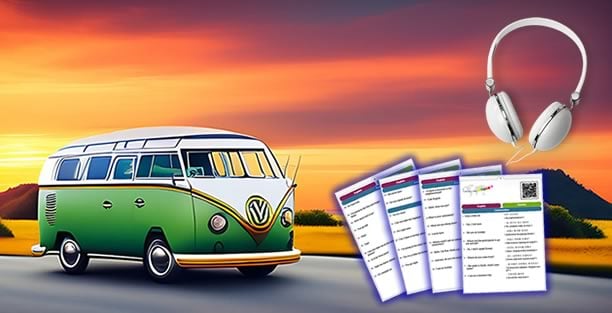Learn Lithuanian
| English | Lithuanian | |||
|---|---|---|---|---|
| Hello | Laba diena | |||
| Good evening | Labas vakaras | |||
| Goodbye | Viso gero | |||
| See you later | Iki | |||
| Yes | Taip | |||
| No | Ne | |||
| Please! | Prašau | |||
| Please! | Prašyčiau | |||
| Thanks | Ačiū | |||
| Thanks a lot | Labai ačiū | |||
| Thank you for your help | Ačiū už jūsų pagalbą | |||
| Thank you for your help | Dėkoju už jūsų pagalbą | |||
| Don't mention it | Nėra už ką | |||
| Ok | Gerai | |||
| How much is it? | Kiek tai kainuoja? | |||
| How much is it? | Kokia kaina? | |||
| Sorry! | Atsiprašau | |||
| I don't understand | Aš nesuprantu | |||
| I get it | Aš supratau | |||
| I don't know | Aš nežinau | |||
| Forbidden | Draudžiama | |||
| Excuse me, where are the toilets? | Kur yra tualetas? | |||
| Happy New Year! | Gerų metų! | |||
| Happy birthday! | Su gimtadieniu! | |||
| Happy holiday! | Gerų švenčių! | |||
| Congratulations! | Sveikinimai! |
How to Learn Lithuanian by Yourself? Start with an Easy and Free Online Course!
We have adopted an objective and efficient approach to learn how to speak a language easily and quickly. We suggest you start by memorizing words, phrases, and practical expressions that you can use in everyday life and that will be useful when traveling.
Getting used to pronouncing words out loud, such as numbers, is an easy exercise you can practice often and at any time throughout the day.
This practice will help you get accustomed to the sounds of your chosen language, making it more familiar.
Once your holidays have begun, whether in Vilnius, Kaunas, or elsewhere in Lithuania, you will be surprised at how familiar and easy to understand it will seem. Furthermore, using a pocket dictionary is always useful, particularly during a trip. It allows you to find the translation of new words and enrich your vocabulary.
Why Speak Lithuanian While Traveling?
As a member of the European Union, the Schengen Area, and the Eurozone, this Baltic State boasts many lakes, forests, and national parks well worth visiting. When visiting the country, do not miss out on major tourist attractions such as the Curonian Spit, the Hill of Crosses, and Trakai Island Castle, the latter being the location of films such as Dungeons & Dragons and Highlander.
If you are interested in the history of Northern and Central Europe, Lithuania could be the perfect destination for a voyage of discovery. Its cultural heritage is strongly influenced by the history and culture of Poland, Ukraine, Russia, Finland, and Romania, which is evident in many aspects, including gastronomy.
Make a Success of Your Stay in Lithuania
Whether you are going to spend a few days with friends on a leisure trip or if you are on a business trip, nothing will be more useful than being able to slip in a few words in the language of your interlocutors. They will appreciate your effort and be more willing to help.
How to Succeed in Having Good Pronunciation Within a Week to a Month?
Spoken by more than 3 million people worldwide, Lithuanian is written with the Latin alphabet, enriched by the use of diacritics and digraphs. Accents can be used to indicate the length of the vowels or the accent of the word. The language also has a pitch accent which distinguishes two mobile intonations, one rough and the other soft.
With 12 vowels and 20 consonants, the pronunciation of Lithuanian is clear and vocalic, closer to Slavic or Romance languages than to Germanic ones due to a lack of aspiration. It is a language of three accents: ascending, descending, and long.
Practical Tips for Learning Lithuanian
1. Start with the Basics
Begin by learning the Lithuanian alphabet and basic pronunciation rules. This foundation will help you read and speak Lithuanian more accurately.
2. Build Your Vocabulary
Focus on everyday words and phrases that you are likely to use. Flashcards and language apps can be very helpful in expanding your vocabulary.
3. Practice Speaking
Speak Lithuanian as much as possible. Practice with native speakers or fellow learners. Use language exchange platforms to find conversation partners.
4. Immerse Yourself
Immerse yourself in the language through Lithuanian media. Watch Lithuanian movies, listen to Lithuanian music, and follow Lithuanian news. This will help improve your listening skills and familiarize you with the cultural context.
5. Use Official Online Resources
There are many excellent official online resources to help you learn Lithuanian:
- Lituanistika: Provides educational materials and resources on the Lithuanian language and culture.
- Lithuanian Ministry of Education, Science and Sport: Offers information and resources for learning Lithuanian.
- Vytautas Magnus University: Offers Lithuanian language courses and educational resources.
- Vilnius Tech: Provides courses and resources for learning Lithuanian.
6. Take a Language Course
Consider enrolling in a language course with a qualified teacher. Personalized instruction can accelerate your learning and help you master difficult concepts.
7. Stay Consistent
Consistency is key. Practice Lithuanian daily, even if only for a few minutes. Regular exposure and practice will lead to steady progress.
By following these steps and utilizing the available resources, you can start speaking and understanding Lithuanian in no time. Happy learning!





